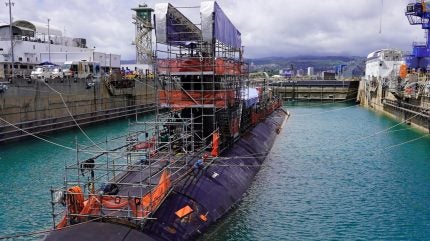
The US Department of Defense awarded a naval contract to a Virginia-based supplier, Defense Maritime Solutions, at the end of August 2024, though manufacturing will take place in the UK.
Under a stand-alone, single-source deal worth $16.38m (£12.44bn), 12 main shaft seal assemblies will be made and delivered to the US Navy Supply Systems Command in support of the nuclear-powered propulsion system for the Virginia-class fast attack submarine fleet.

Discover B2B Marketing That Performs
Combine business intelligence and editorial excellence to reach engaged professionals across 36 leading media platforms.
A main shaft seal in a submarine is a mechanical seal that is a vital part of the boat’s main propulsion system. Its purpose is to prevent fluids from leaking as it withstands the demands on a submarine, including: vibration, corrosion, pressure and shock.
All work is set to take place in Havant, Hampshire in Southern England and is expected to end in June 2026. However, there are no options for additional components.
AUKUS industry integration
Since the establishment of the trilateral AUKUS alliance – through which the the UK and US aim to furnish the Royal Australian Navy with its own nuclear-powered attack submarines (SSNs) – companies either side of the Atlantic are increasingly entrenched in each another’s industrial bases.
Primarily, Australia and the UK will design and build a new class of SSN AUKUS boats incorporating US submarine and naval nuclear propulsion technology. The first UK-built boat is to be delivered to the Royal Navy in the late 2030s, and the first Australian-built boat is scheduled for completion in the early 2040s.

US Tariffs are shifting - will you react or anticipate?
Don’t let policy changes catch you off guard. Stay proactive with real-time data and expert analysis.
By GlobalDataWhen it comes to delivering the existing Virginia-class SSNs, the programme is said to be behind schedule. Although Virginia-class boats been procured at a rate of two SSNs per year, the actual production rate has fallen short of two units per year, and since 2022 has been limited by shipyard and workforce capacity and supply chain challenges to about 1.2 to 1.4 boats per year, resulting in a growing backlog of boats procured but not yet built.
US is overburdened
It makes a lot of sense to source production for certain components out to industries based in close partner nations such as the UK when the domestic industrial base is overburdened.
Already, Britain’s naval nuclear prime Rolls-Royce has provided more than 500 naval propellers to US surface combatant ships and Virginia-class submarines as well as other navies around the world.
Amid a period of recovery from the global Covid-19 pandemic, supply chains are reforming and the success of the US Navy is increasingly dependent on allied support – at least, that’s what the US Secretary of the Navy, Carlos del Toro, asserted in his flagship policy for a new ‘Maritime Statecraft’ last year:
“Maritime statecraft, in a broad sense, encompasses… [a] whole-of-government effort to build comprehensive US and allied maritime power…”
Other allied nations are supporting the US submarine industrial base too, including South Korea, whose Hanwha Systems and Hanwha Ocean, two major players in the global sector, recently purchased Philly Shipyard. The agreement, del Toro noted two months ago, is “centered on attracting Korean investment in integrated commercial and naval shipbuilding facilities in the United States.”





